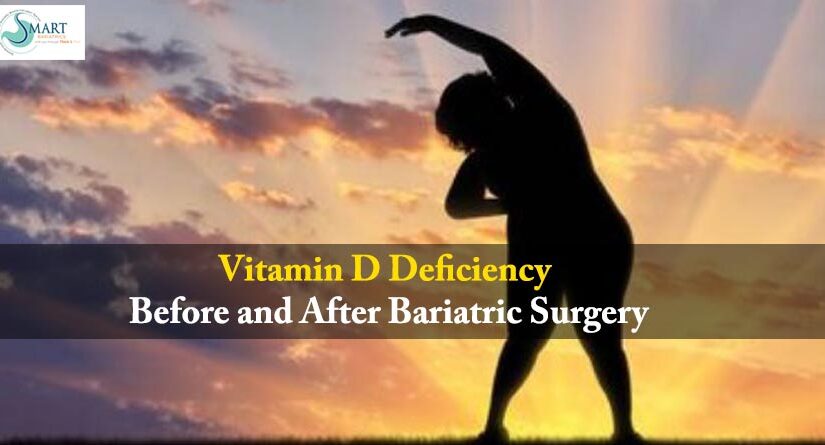Vitamin D is a fat soluble vitamin. It enhances calcium absorption, though its own absorption takes place in the second and third part of the small intestine. Reference ranges for vitamin D concentration in blood are, <20 nmol/L is deficient, 20 – 29 nmol/L is insufficient, 30 – 100 nmol/L is sufficient, and >100 nmol/L is potential toxicity.
It is important to note that hypovitaminosis D exists in large proportion of subjects before undergoing bariatric surgery, most likely due to less intake of vitamin D rich and fortified foods, insufficient sun exposure, seasonal and cultural variation, lifestyle and high BMI.
Vitamin D is essential to maintain normal calcium levels by assisting in absorption. Individuals who are obese have greater fat mass, so extra vitamin D is required to maintain normal levels, due to the fact that vitamin D is isolated in adipose cells. Vitamin D deficiency is more common in dark people. Melanin concentrations in the skin present as a risk element for vitamin D deficiency, with higher concentrations providing a bigger risk due to the fact that melanin prevents vitamin D production. Research suggest that a BMI increases the rate of vitamin D deficiencies also increases.
There is proof recommending that bariatric surgery procedures can cause a adverse impact on bone mineral density, speeds up bone loss, and increase bone fragility. Though, these negative effects can generally be reversed with adequate supplementation post surgery. Serum calcium levels often remain within normal range in post-bariatric surgery patients, due to the regulatory pathways in the body. Unfortunately, obese people classically have abnormal vitamin D levels due to confiscation of vitamin D within fat cells, as well as due to a sedentary lifestyle with limited sunlight exposure. It’s assumed that changes in gut hormones after bariatric surgery can cause vitamin D deficiency in post-operative patients.
High PTH (Para-Thyroid Hormone) levels indicate low vitamin D and calcium levels. Patients who achieve normal vitamin D and calcium intake through diet and supplementation show low parathyroid hormone levels.
Including fortified cereals, fortified dairy products, fish and egg yolks is important to get vitamin D through diet. Also sensible sun exposure between 10am to 3pm in minimal clothing is good to produce vitamin D in the skin. At least 3000 IU vitamin D per day is important for repletion.
Be aware, be healthy!!






